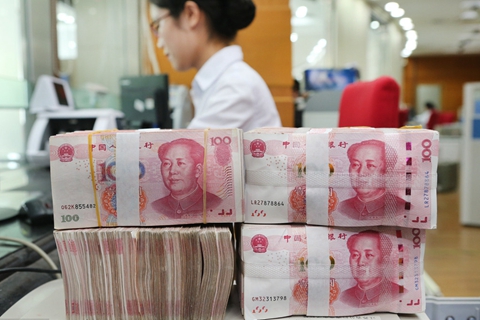China Lending Rebounds as Supportive Policies Take Effect

China’s total social financing rebounded in November from an all-time low in October, but banks were still not motivated enough to provide medium and long-term bank loans to businesses.
China’s total social financing (TSF), a broad measure of credit and liquidity in the economy, expanded by 1.52 trillion yuan ($221.15 billion) in November, beating expectations and more than double the October gain, data from the central bank showed Tuesday.
Credit flows are normally higher in November compared with October when the Golden Week national holiday removes several working days from month. The November TSF growth number was down by 393.9 billion yuan compared with the same month last year.
The growth of outstanding TSF slowed to a new record low of 9.9% from 10.2% in October, as regulators continued to crack down on off-balance sheet shadow loans to rein in financial risks.
Chinese banks extended 1.25 trillion yuan in net new yuan loans in November, an increase of nearly 80% from October and more than 10% from a year ago.
The November rebound in bank loans was mostly driven by household loans and commercial bill financing. More than half of the new yuan loans in November came from household loans, which increased by 35.5 billion yuan from the same period a year ago and 92.4 billion yuan from October.
Analysts attributed the growth in household loans to strong growth in credit card loans and consumer loans boosted by the Double 11 shopping festival on Nov. 11, the Chinese equivalent of Black Friday and Cyber Monday in the U.S.
New corporate loans almost quadrupled from October, to 576.4 billion yuan, about 40% coming from commercial bill financing. New medium and long-term bank loans to businesses declined from a year ago.
The central bank’s recent efforts to loosen monetary conditions and the government’s stepping up of fiscal support have not been enough to stabilize growth of lending to the public and private sectors, said Liu Chang, China economist at Capital Economics, in a research note.
“With credit growth still slowing, economic activity will continue to come under pressure in the months ahead,” Liu wrote in the note, “We think officials will respond by providing additional stimulus, including cuts to benchmark lending rates.”
The People’s Bank of China (PBOC) has slashed banks’ reserve requirement ratios four times this year, and more cuts are expected in 2019. The central bank has also provided a total of 300 billion yuan of relending and rediscount quotas targeting micro and small businesses.
TSF also includes off-balance sheet forms of financing, or shadow banking, that exist outside the conventional bank lending system. Further shrinking of off-balance sheet financing remained a drag on growth of TSF in November.
Combined trust loans, entrusted loans and undiscounted bankers’ acceptances, which are common forms of shadow banking finance, fell by 190.4 billion yuan in November, following a slide of 2.57 trillion yuan in the first 10 months.
The continued decline in off-balance sheet financing reflected weakening demand for financing from local governments and property developers, said Zhang Jiqiang, a fixed-income analyst with Huatai Securities.
Local governments maxed out their bond quotas after a rush of debt issuance in the third quarter. Local government special bond financing decreased by 33.2 billion yuan from October. The PBOC added local government special bond issuance into the TSF calculation starting in September.
One highlight in November was a significant rebound in corporate bond financing, reflecting a series of steps taken by the authorities to lend support for debt sales by private enterprises.
Corporate bond financing increased by 231 billion yuan in November to 316.6 billion yuan.
The loose credit policy has started to take effect, said Ming Ming, a fixed-income analyst with Citic Securities Co. He said he expected the yields on corporate bonds to drop in the future with the support of loosening monetary policy.

- 1Cover Story: China Carves Out a Narrow Path for Offshore Asset Tokenization
- 2Drownings Shake Chinese Enthusiasm for Travel to Russia
- 3Over Half of China’s Provinces Cut Revenue Targets
- 4Li Ka-Shing’s Port Empire Hit by Forced Takeover Amid Panama Legal Dispute
- 5In Depth: China’s Mutual Fund Industry Faces Overhaul After a Banner 2025
- 1Power To The People: Pintec Serves A Booming Consumer Class
- 2Largest hotel group in Europe accepts UnionPay
- 3UnionPay mobile QuickPass debuts in Hong Kong
- 4UnionPay International launches premium catering privilege U Dining Collection
- 5UnionPay International’s U Plan has covered over 1600 stores overseas





